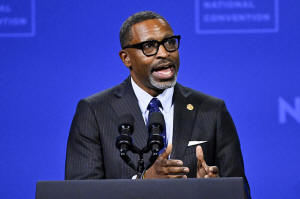NAACP lists companies that dump DEI in its tactical spending guide for
Black Americans
 Send a link to a friend
Send a link to a friend
 [February 17, 2025] By
MATT BROWN [February 17, 2025] By
MATT BROWN
WASHINGTON (AP) — The NAACP wants Black Americans to steer their buying
power toward companies that haven’t pulled back from diversity, equity
and inclusion programs under conservative pressure, and the nation’s
oldest civil rights organization is listing which brands have stood by —
or reversed — past commitments to DEI.
The NAACP says the spending guide it published Saturday is needed
because DEI initiatives promote the social and economic advancement of
Black Americans, who are projected to consume nearly $2 trillion in
goods and services in nominal dollars by 2030, according to the McKinsey
Institute for Black Economic Mobility.
“Diversity is better for the bottom line,” NAACP President Derrick
Johnson said in an exclusive announcement to The Associated Press. “In a
global economy, those who reject the multicultural nature of consumerism
and business will be left in the past they are living in.”
Keisha Bross, an economic strategist at the NAACP, says they are not
calling for a “boycott” of companies but instead encourage consumers to
“buy-in” on companies that back their values. People of all backgrounds
are encouraged to use the Black Consumer Advisory.
The NAACP is speaking with executives at companies named in the advisory
for reversing their DEI policies — including Lowe’s, TargetWalmart,
Amazon, Meta, McDonald’s, and Tractor Supply — and will update its
guidance as companies roll back or reaffirm commitments to DEI.

The advisory praises Costco for standing by previous commitments, as
well as Apple, Ben & Jerry’s, Delta Airlines, e.l.f. Cosmetics and
JPMorgan Chase & Co.
The effort comes as corporations, governments and other major
institutions face pressure to roll back DEI policies amid a backlash
from the Trump administration and Republican-led state governments.
Soon after taking office, President Donald Trump signed an executive
order directing federal agencies to end “illegal preferences and
discrimination” in government and instructed federal agencies to find
ways alongside the Justice Department to “encourage the private sector
to end illegal discrimination and preferences, including DEI.”
[to top of second column] |

NAACP President and CEO Derrick Johnson speaks at the 115th NAACP
National Convention in Las Vegas, July 16, 2024. (AP Photo/David
Becker, File)
 DEI policies are a catchall term for
programs meant to promote fair treatment, impartial hiring and
cooperation between people from different backgrounds. Such policies
vary wildly but often include anti-discrimination mandates and
training meant to inform people about how to promote inclusive
values. Some institutions hire staff who focus on implementing DEI
policies.
The advisory looks at which companies are backtracking on prior
commitments, including by eliminating diversity officer positions,
ending hiring practices meant to boost staff diversity or supplier
diversity standards, or reducing investments in Black communities
such as support for historically Black colleges and universities.
The study by McKinsey also found that Black Americans are more
likely to live in communities that lack access to the goods and
services of major companies.
Johnson, the NAACP president, said he wants to provide a framework
for Black communities “as we make difficult decisions on where to
spend our hard-earned money.”
“If corporations want our dollars, they better be ready to do the
right thing,” he said.
Trump's orders also face legal pushback. In February, a group that
included the mayor of Baltimore and an association representing
university professors sued the Trump administration over the orders,
claiming that the directives violated civil rights law.
“In his crusade to erase diversity, equity, inclusion, and
accessibility from our country, President Trump cannot usurp
Congress’s exclusive power of the purse, nor can he silence those
who disagree with him by threatening them with the loss of federal
funds and other enforcement actions,” the plaintiffs in the lawsuit
wrote.
More litigation surrounding DEI in the private sector is pending.
The Federal Communications Commission recently sued Comcast over its
DEI policies. And the state of Missouri in February filed a lawsuit
against Starbucks over its DEI policies. Companies including Apple,
Berkshire Hathaway, Coca-Cola, IBM, Mastercard and Pepsico face
shareholder resolutions challenging their DEI practices.
All contents © copyright 2025 Associated Press. All rights reserved |